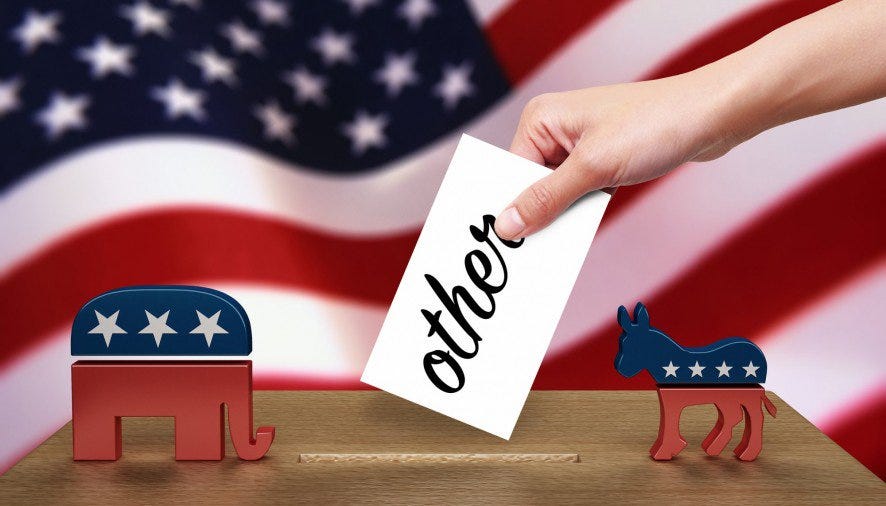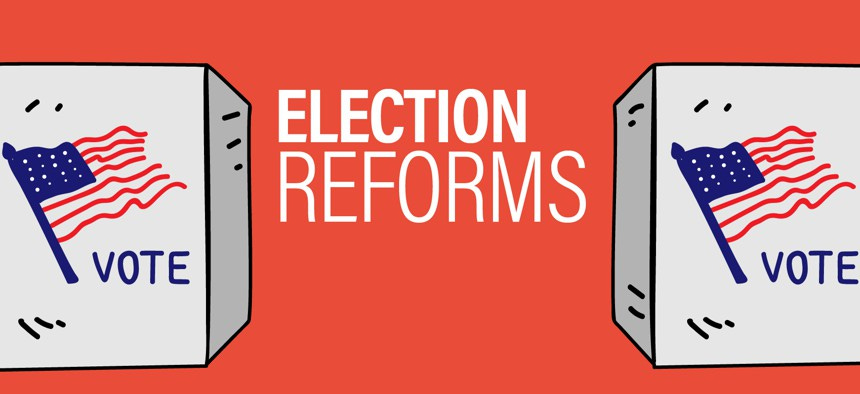Why the USA needs more political parties
Or we can continue our downward spiral into partisan polarization and conflict
See my other articles on Electoral Reform:
I believe that we can best understand human progress with the concept of the Five Keys to Progress. Unfortunately, the United States has problems with the third key.
“Decentralized political, economic, religious, and ideological power. It is of particular importance that elites are forced into transparent, non-violent competition that undermines their ability to forcibly extract wealth from the masses. This also allows citizens to freely choose among institutions based upon how much they have to offer to each individual and society in general.”
Let me go quickly through the ways that the United States is going in the wrong direction on this key. Our current American political system:
Concentrates political power into the hands of very liberal Democrats and very conservative Republicans
Highly restricts competition between political parties
Makes it very difficult for new parties to be formed and become competitive
Overcentralizes power into the hands of the federal government
Restricts the ability of local and state governments to experiment with different policies
Makes it very difficult to identify and implement policies that actually work.
The importance of non-violent transparent competition
I believe that a key driving force in progress is non-violent transparent competition. All humans have a Drive for Power, and some humans have it far more than others. We cannot change that, but we can change the terms of competition so that Drive for Power leads to positive benefits for society.
Ever since the invention of agriculture, elites have prospered by extracting money and food surplus from farmers in the form of taxes or land rent. In doing so, they ensured that the energy that was embedded in that food surplus went to themselves instead of the masses.
A key political innovation that enabled progress was forcing political elites to compete against each other non-violently to access the state. Over the centuries, this evolved into modern democratic governance that focuses on political parties competing against each other in elections. All political parties present an agenda and leaders who will try to implement that agenda and voters decide which best fits their interests and values.
American parties
The American political system has been dominated by two parties more or less uninterrupted since the 1790s. And it has been dominated by the same two parties since the 1850s (the Democrats and the Republicans)!
For almost all that time, the Democrats and Republicans represented loose collections of ethnic, religious, and regional minorities who united only on the federal level. It has only been within the last 60-90 years (depending on your perspective) that those parties have been at all united around something that we can call an ideology.
One other most important trend since the early 1970s has been the ideological polarization of the two parties. The Democratic party has moved progressively to the Left, so that now it better represents a very small ideological minority composed of about 10-15% of Americans. The Republican party has done the same in the opposite direction. This leaves the majority of the American people effectively unrepresented.
Worse, in the vast majority of elections, one party is almost guaranteed to win. This makes the primary of the majority party the real election and the general election a de facto rubber stamp. Since very few voters actually vote in primaries, this enables the 10-15% most ideological to determine the nominee.
Why we need competitive third parties
What has enabled this trend to occur is a lack of political competition from third parties. Just like in the economy, it is the entry of new organizations based on entirely new business models and technologies that enables economic growth to take place. While it is very easy to form a new company, it is extremely difficult to form a new party. And enabling that party to scale up so that it is truly competitive in the general election is even harder.
This is certainly not because the American people are happy with the two major parties. It is very clear that the opposite is the case. It is because of the rules of the game. While there are many rules that benefit the two majority parties (ballot access rules, media coverage, campaign finance rules, debate entry rules, etc), the biggest is the electoral system.
The most important problems undermining competition between the parties is:
Candidate nomination system (i.e. that Independent cannot choose a candidate)
Plurality voting (i.e. that the candidate who receives the most votes wins)
Single-member districts (i.e. the majority party in a specific region gets all the representation)
My Proposal for electoral reform
This is one issue where supporters of Progress may have widely divergent views, but my preferred electoral reform would be to establish the following for all federal, state, and local elections:
Establish an Independent primary.
Shift to ranked-choice voting.
Shift from single-member districts to multi-member districts for the U.S. House, Electoral College, and state legislatures.
Select legislative leadership using ranked-choice voting by the entire membership
You can read more details on my reform proposals list above here and also a plan for how we can turn the plan into reality.
The resulting political system
Once most or all of these electoral reforms are implemented, it is not difficult at all to envision a future Congress and state legislatures that include representation from:
Center-right Republicans and MAGA Republicans in separate parties
Progressive Democrats and Center-left Democrats in separate parties
A true Centrist party
A separate party that represents black voters
A competitive Green party
A competitive Libertarian party
A collection of Independent representatives who are not captive to any specific ideology
Who knows maybe there will even be a party based on the Progress-based perspective.
Obviously, the representation in Congress and state legislatures will vary greatly by geography, but with absolutely no change in public opinion, something like the above is foreseeable.
Now do not get me wrong. I am not saying that more competitive parties will solve all problems. A political establishment dominated by very liberal Democrats and very conservative Republicans will not be unwound easily. If such a system had been implemented in the early 1970s, I am sure that we would be in a much better place, but that does not mean that establishing it in the 2020s will have the same effect.
I do believe, however, that more competitive parties will:
Break the power of the 10-15% who are most liberal and the 10-15% who are most conservative over the federal government
Break the almost total dominance of the majority party on the state and local level.
Force political elites to do more than just try to rally their political base
Lower the intensity of partisan conflict.
Enable new issues to enter the legislative agenda more easily
Enable new solutions to those issues to enter the legislative agenda more easily
Defuse the threat of violence and civil war
Why this is better than the European system
Many advocates of electoral reform advocate for a shift to an electoral system that more closely resembles the European system. While there is much variation on the European Continent, most of their electoral systems have some form of Proportional Representation with the Prime Minister selected by the parties. I too see this system as preferable to what we have now in the United States.
I agree with these reformers that the European system has many advantages, but it also has some serious disadvantages in the American context:
Replacing the President with a Prime Minister appointed by Congress would take a constitutional amendment and would likely be unpopular with the American people.
Some types of PR eliminate geographical representation, which is very important to many voters and built into the U.S. Constitution.
Some types of PR create so many parties that it is difficult for the parties to form a governing coalition and appoint a Prime Minister
Most types of PR typically give total control to the party leaders
All types of PR make it very difficult for Independents to get elected
I believe that my electoral reform proposal takes all the benefits of the European PR system and makes it possible to implement without amending the U.S. Constitution. All but one of my proposals can implemented via state-level initiative.
My advice to Europeans
The European electoral system has many advantages, but it also has some serious disadvantages that are becoming increasingly evident. In particular:
Party leaders are insulated from public opinion because they know that they will get elected regardless of how their party performs. This problem is partly overcome by a tradition of resignation after poor electoral performance,
Very long delays in selecting the Prime Minister, Cabinet, and government platform immediately after elections
Voters being forced to choose between party platform and the leadership and likability of the party leaders.
I think Europeans should seriously think about shifting to directly elected Prime Ministers via ranked-choice voting. This would:
Give the single most important decision to the people
Eliminate the partisan dead-lock that often follows elections
Enable Prime Ministers to form majorities issue-by-issue rather than being forced to create governing majorities that cover all issues.
In this way, European Prime Ministers would more closely resemble the American President.
Other reform proposals
Don’t get me wrong. Reforming our electoral system will not be enough. We will also need to make major reforms in the policy-making process and decentralize government power, including:
Radically decentralize domestic policy domains and create more states.
Improve policy outcomes by embedding Randomized Controlled Trials (RCTs) in the policy-making process.
Implement many policy reform proposals to promote Progress and Upward Mobility.
Build a more secure system that reduces the chances of ballot fraud.
See my other articles on Electoral Reform:










In my opinion, the goodness of a system seems only weakly related to its structure and more strongly related to its people navigating that structure. This makes me distrust these types of proposals that seek to fix the goodness of a political system through adjusting its structure.
In addition, I cannot ever advocate for more complexity in our political system in favor of more bells and whistles. Complexity is a daemon when it’s comes to diagnosis. When I am trying to figure out what has made the system become operated by bad men, the last thing I want is to contend is the dynamics of thousands of pages of law and dissertations on game theory. Make it simple, make it good!
How about finally ratifying the Congressional Apportionment Amendment (CRA)? (https://en.wikipedia.org/wiki/Congressional_Apportionment_Amendment ) At this time, there are 435 US representatives, so with a US population of roughly 330 million, there is one representative for approximately 760,000 US constituents. If the CRA is enacted, requiring one representative for every 50,000 constituents, then the US House requires a lot more offices and chairs for its new population of 6,600 representatives.
Imagine the chaos! How would the US benefit? First, who would have the time to gerrymander all the voting districts? More important: the Two Party stranglehold would be weakened with a (more) unmanageable representative population. Even if the new 6,600-member house was mostly composed of Democrats or Republicans, members should find it easier to caucus with like-minded members per individual bill. Ideally, the result would be more interaction based on issues rather than based on strict party lines.